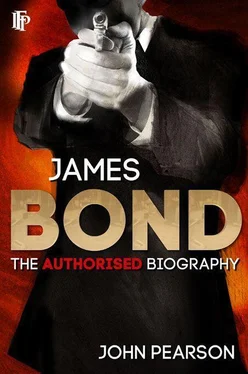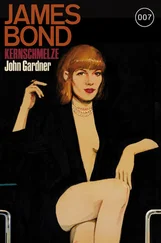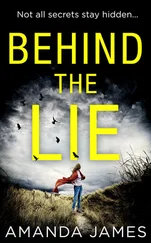John Pearson - James Bond - The Authorised Biography
Здесь есть возможность читать онлайн «John Pearson - James Bond - The Authorised Biography» весь текст электронной книги совершенно бесплатно (целиком полную версию без сокращений). В некоторых случаях можно слушать аудио, скачать через торрент в формате fb2 и присутствует краткое содержание. Год выпуска: 2008, ISBN: 2008, Издательство: Random House, Жанр: Шпионский детектив, на английском языке. Описание произведения, (предисловие) а так же отзывы посетителей доступны на портале библиотеки ЛибКат.
- Название:James Bond: The Authorised Biography
- Автор:
- Издательство:Random House
- Жанр:
- Год:2008
- ISBN:9780099502920
- Рейтинг книги:4 / 5. Голосов: 1
-
Избранное:Добавить в избранное
- Отзывы:
-
Ваша оценка:
- 80
- 1
- 2
- 3
- 4
- 5
James Bond: The Authorised Biography: краткое содержание, описание и аннотация
Предлагаем к чтению аннотацию, описание, краткое содержание или предисловие (зависит от того, что написал сам автор книги «James Bond: The Authorised Biography»). Если вы не нашли необходимую информацию о книге — напишите в комментариях, мы постараемся отыскать её.
James Bond: The Authorised Biography — читать онлайн бесплатно полную книгу (весь текст) целиком
Ниже представлен текст книги, разбитый по страницам. Система сохранения места последней прочитанной страницы, позволяет с удобством читать онлайн бесплатно книгу «James Bond: The Authorised Biography», без необходимости каждый раз заново искать на чём Вы остановились. Поставьте закладку, и сможете в любой момент перейти на страницу, на которой закончили чтение.
Интервал:
Закладка:
With Andrew away for days on end, and Monique occupied with a new admirer, nobody appeared to mind what happened to the boy. He must have picked up more than a smattering of Arabic (much, to his regret, entirely forgotten) and with his dark complexion seems to have become almost an Arab boy himself. One of his strangest memories of this period is of waiting with his followers one evening outside a big hotel in Cairo, watching the cars arrive. Suddenly a black and yellow Rolls drew up. Out stepped his mother followed by a fat man with a monocle. James recognized him as an Armenian contractor who had visited the house on business with his father. The man seemed so gross that he couldn't imagine what his mother was doing in his company. James called out to her, but the smart Mrs Bond failed to recognize the street Arab as her son. Next day, when he asked his mother what she was doing at the hotel, she became furious, insisted she had been at home, and ordered James to his room for insolence.
This was, as Bond says wryly, his first real lesson in the female heart.
Finally, there seems to have been some sort of family crisis – the boys were getting used to them by now – and, on the grounds that Cairo heat was bad for his wife's health, Andrew Bond was once again transferred – this time to France. For Andrew, the worse his marriage, the better his career, and by now he was becoming one of the Metro-Vickers’ key men in the power stations they were building through the world. Once more he took a big house for his family – this time along the Loire, not far from Chinon – and once more the same old pattern seemed to reassert itself, with all the erratic ups and downs of an unhappy family. Theoretically they were quite rich, but there was never money to go round. Monique was wilder than ever. Servants would come and go.
France suited James. He picked up the language, loved the food and made a lot of unexpected friends – the boatmen on the river, the village drunk, the gendarme and the madame who kept the caf in the village. He also fell in love for the first time – with the butcher's daughter, a sloe-eyed, well-developed girl of twelve, who deceived him for an older boy who had a bicycle.
James Bond remained in France a year – then his world changed again. In 1931 the Metro-Vickers combine won an unprecedented contract from the Soviet Government to construct a chain of power stations around Moscow as part of Stalin's policy for the electrification of Russia. Inevitably, Andrew Bond was despatched with the advance party of British engineers. Three months later he sent for his family to join him.
The Metro-Vickers representative in Paris had booked the Bonds a first-class sleeper to themselves, and Bond can still remember the small details of the journey – the rare excitement of eating a meal with his mother in the restaurant car, the white gloves of the waiters, the mineral water and the reading lamp beside his bed. As the train thundered east towards the Polish frontier, he can remember dropping off to sleep to what Fleming called ‘the lullaby creak of the woodwork in the little room’, then waking drowsily to hear the porters calling out the names of German stations in the night. This was Europe, the grey Prussian plain as dawn was breaking, Warsaw by breakfast-time. That evening he watched as the train slowed down and passed the red-and-white striped posts marking the Russian frontier.
James saw his first Russian policeman then – a large silent man in dark blue uniform and red-starred cap who checked their papers. Grey-tuniced porters helped the family aboard the Moscow Express, a magnificent relic from pre-Revolution days. Once more the Bonds had their own compartment – this time with rose-pink shaded lamp and Victorian brass fittings. In the restaurant car, as foreign visitors with roubles, they ate even better than the night before – it was here, incidentally, that Bond formed a life-long love of caviare. All this made the arrival next day at Moscow something of a shock.
The British families had been herded together in Perlovska, a small place twenty miles from Moscow. By Russian standards the little wooden house the Bonds were given was the height of luxury – for Monique it was unspeakable. There were no shops, no night-life and no entertainment. With winter coming, life was bleak. There was famine in the land.
Ten-year-old James Bond was getting an impression of Soviet Russia that has never really changed. Deep down he still believes this is a land of starving peasants, cowed citizens and an all-powerful secret police. These conclusions must have seemed dramatically confirmed by the events he witnessed in the early months of 1932.
Historians are still arguing the causes of the so-called Metro-Vickers trial of that year, when several of the leading British engineers on the power-station project were put on trial in Moscow, charged with sabotage.
For the Bond family, huddled in their freezing house in Perlovska, it was all hideously real. Andrew Bond's friend, the minister Tardovsky, had already been arrested. Rumours were everywhere. Then the six British engineers – the Bonds knew them personally – were carried off to the fearful Lubyanka prison, by the secret police. It seemed a miracle that Andrew was not among them.
Throughout the desperate weeks of the trial that followed, James Bond was to become one of the few Westerners to have lived through a Russian purge at first hand. (Those who condemn him for his anti-Communism should remember this.) He has not forgotten the scared families, the hopelessness of waiting, the cold dread of the next move of the police.
Andrew was something of a hero, always on the move between the Kremlin, the British Embassy and the Lubyanka, briefing the lawyers and helping to keep the prisoners' spirits up. Monique was less resilient. As James Bond says, it was easier for his father – he had something to do. Monique could only wait. Under the tension and privation of the camp, her health suffered and her nerves got worse. She could not sleep, complained of headaches, and begged her husband to get them out of Russia. Sternly he told her that they would not leave until the trials were over.
During this period, James Bond had an uncanny glimpse into the future. Several of the accused engineers had been released on bail, and were waiting in the compound of Perlovska for the trial to start. James, along with most of the English nationals, was with them. Suddenly a car drew up, a big, official-looking limousine. Out stepped a tall, impeccably-dressed young Englishman, looking for all the world as if about to enter some St James's club. Sounding distinctly bored, he introduced himself. He was a Reuter's correspondent, sent out from London for the trial. His name was Ian Fleming.
The two things about him that stuck in James Bond's memory were his suit – an outrageous check, the like of which had not been seen before in Moscow, let alone Perlovska – and his unruffled ease of manner. Despite himself, James Bond was most impressed, and there and then changed his mind about being an engineer when he grew up. All these things considered, it seemed a better bet to be a journalist.
Although he had to stay on at Perlovska throughout the trial, James heard all about it from his father. It was from him that he learned of the impassioned speech of Andrei Vishinsky, the vitriolic Russian prosecutor. When the verdicts were announced they amounted to a triumph for Andrew Bond. All but two of the engineers were acquitted. Andrew was congratulated by his company and marked out for promotion. Still more important for the Bonds, their ordeal was over. The Metro-Vickers mission was withdrawn from Russia. The family was coming home at last.
With Andrew appointed to head office, he took a house in Wimbledon, 6 North View, an echoing Victorian monstrosity facing the Common. Here the Bonds settled for the summer. They must have appeared an odd, outlandish family. Andrew was thirty-eight, but looked much older, his big-nosed, craggy face now lined and battered by the last few years. The two boys also must have borne the marks of their ordeal. They, too, looked older than their years and both of them seemed strangely out of place among the well-to-do children of their neighbours. They were oddly dressed. James Bond ascribes his subsequent sartorial conformism to childhood anxieties on this score. He still remembers other children laughing at his lederhosen . He says he also felt distinctly foreign here in Wimbledon. He was not used to hearing English spoken – he and his mother generally conversed in French. As a result, he felt himself painfully unwanted. Although back in England, he was as much of an outsider as ever.
Читать дальшеИнтервал:
Закладка:
Похожие книги на «James Bond: The Authorised Biography»
Представляем Вашему вниманию похожие книги на «James Bond: The Authorised Biography» списком для выбора. Мы отобрали схожую по названию и смыслу литературу в надежде предоставить читателям больше вариантов отыскать новые, интересные, ещё непрочитанные произведения.
Обсуждение, отзывы о книге «James Bond: The Authorised Biography» и просто собственные мнения читателей. Оставьте ваши комментарии, напишите, что Вы думаете о произведении, его смысле или главных героях. Укажите что конкретно понравилось, а что нет, и почему Вы так считаете.












